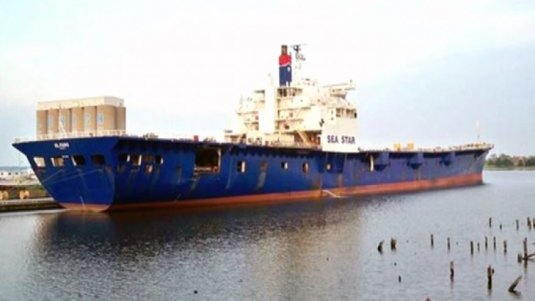As the tragedy of the El Faro continues to unfold, it is so sad to hear about the loss of life in this story. The El Faro believed sunk by Hurricane Joaquin off the southern Bahamas, lost its entire 33-member crew. The vessel was en route to San Juan, Puerto Rico from Jacksonville, Florida before disappearing in what maritime experts called the worst cargo shipping disaster involving a U.S.-flagged vessel in more than 30 years. With wreckage located 15,000 feet on the seafloor, the National Transportation Safety Board (NTSB) was working along with the Navy to retrieve the data recorder from the ship. However, the search has been suspended several times due to inclement weather.
However, Tropical Storm Kate suspended salvage operations for the sunken cargo ship due to winds of 45 miles per hour moving through the Bahamas. According to reports from the Associated Press (AP), the vessel prevented the captain of the 790-foot ship from bypassing the hurricane. The AP also reported that the El Faro had no history of engine failure, and the company modernized the vessel in 1992 and 2006. Coast Guard records show it underwent its last inspection in March.
While the El Faro is receiving international attention for being in the wake of Hurricane Joaquin’s path, annually, many shipping disasters do not receive any attention from the media. Bad things seem to happen at sea on a consistent basis. On average, a ship sinks every day according to reports from Lloyd’s of London. In addition to the vessel losses, the International Transport Worker Federation (ITF) also claims that 2,000 seafarers lose their lives each year. The chances of loss during transit are far greater than the risk of a fire in a warehouse. Most damage occurs en route to/from ports and 30% of losses during transit are unavoidable.
The lesson every shipper can learn from this tragedy is that no matter what precautions one takes, the unforeseeable may happen. A retired owner of the company that owns the El Faro, Mike Garvey, said he could never have imagined a situation as bad as the El Faro’s disappearance during a hurricane. “If I had made a list of the risks that we had in the company that would have been on the bottom,” he said. “I never would have guessed. It is a horrible, horrible tragedy.”
Let’s face it, global shipping is complicated. In theory, it is not a fantastic opportunity for every company to pursue. The reality is that it’s filled with road blocks and signals that can leave us yearning for friendly borders. And without the security of proper protection of your supply chain, you are likely to flounder like a fish out of the water. To help you overcome this barrier, OCEANAIR is sharing the truth about cargo insurance.
The truth about marine cargo insurance is simple. It is an unregulated line of insurance with no standard policy form or required minimum coverage. According to a recent study, 80% of most cargo plans lack the coverage needed to ensure a shipper’s transit exposures. Please download this free must-have report to understand the advantages of having the right cargo insurance policy. You will learn about importing risks, marine cargo insurance, uninsured cargo and the best tips of the trade.


